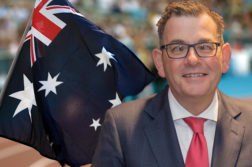In case you missed the Treasurer crowing about it last night, while other countries struggle with huge deficits and growing debt, the Australian Government now expects to produce a fiscal surplus by 2012–13. Last year’s budget was expansionary, "framed against the backdrop of the deepest global recession since the Great Depression", to quote the opening sentence of Budget Paper 1. This year’s budget reverts to the familiar theme of fiscal conservatism — a concern to rein in government debt.
But how wise is this? As Ben Eltham observed in his budget breakdown on newmatilda.com earlier this morning, by comparison with other developed nations we do not have a large debt. At 5.6 per cent of GDP our net government debt is trivial beside Greece’s, which stands at 115 per cent of GDP, and is well below the 50 per cent or so which is typical of other developed countries. No wonder our Treasurer finds it so hard to be modest.
However, this obsession with debt may prove costly for us. As anyone who has ever looked at company accounts knows, a balance sheet has two sides: debt (and equity) on one side, assets on the other. Has our debt obsession, generated by 30 years of neo-liberal propaganda, taken our eye off the other side of our balance sheet? And, in looking only at financial debt, are we ignoring other liabilities?
Greece’s debt problem is not so much its size (about the same as Japan’s) but its purpose. Debt there has been used to finance current consumption, such as generous public sector salaries and age pensions which are unsustainable in relation to the nation’s productive capacity. If Greece were a corporation, we would say it is broke, because it has inadequate assets to match its liabilities.
Greece’s saviour, Germany, has reasonably high public debt at about 60 per cent of GDP, but it has two distinct advantages over Greece. First, its debt is domestic; it is not borrowed from other countries. Second, and more importantly, it is backed by public assets, such as superb transport infrastructure and investment in human capital. It has not been frittered away in consumption.
Australia, by contrast, could be considered to have a weak balance sheet, because of a long period of inadequate public investment. Our physical infrastructure is badly worn: compare, for example, our highways, railroads, and urban transport systems with Germany’s. Our industries are ill-equipped to cope with climate change — another area where Germany has leapt way ahead of Australia.
Then there are debts that are real but which don’t show up in the accounts. As Bob Brown has pointed out, we are looking at significant cuts in environmental spending. In depleting our environmental assets — our water and soils for example — we are incurring liabilities: like the Greeks, we are living beyond our means. These debts aren’t revealed in our budget papers, but that’s only because of an artefact of accounting conventions. Someday, if we are to sustain our long-term prosperity, we will have to pay those debts, and the longer we leave it the more we will have to pay.
If we had an Opposition with any economic nous, it would be criticising the Government for its failure to attend to our public assets. Rather than carping about the $43 billion for national broadband, it could be pointing out the opportunities foregone by a miserly approach to public finance. To illustrate: Australia could invest, using debt finance, $200 billion in physical infrastructure, education, environmental restoration and in making ready for climate change, and still have a level of public debt only a quarter of Germany’s.
We are possessed by facile dogmas, however, that government spending is bad, and that public debt is particularly bad, regardless of its purpose. We will know we have broken from such thinking only when the Treasurer, introducing a budget sometime in the future, opens with a statement about the condition of our shared assets — that is, our common wealth.
Donate To New Matilda
New Matilda is a small, independent media outlet. We survive through reader contributions, and never losing a lawsuit. If you got something from this article, giving something back helps us to continue speaking truth to power. Every little bit counts.



